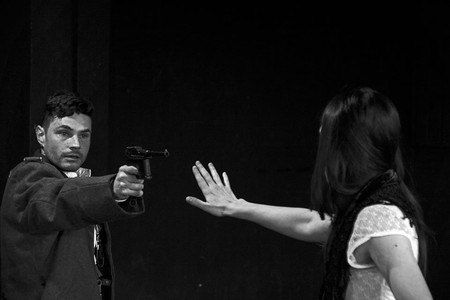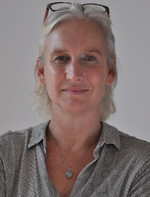— Kann nicht mehr besucht werden —
 1
1 2
2
- Theater + public discussion
- violent
- poetic
- cathartic
-
Fr., 16.03.2018, 20:00
Artist Talk following 'Robar el día' (To Steal The Day)
The clash of nature and technology questions our very humanity in this verse play set at the end of WWI. In Spanish with German and English surtitles. After the stage play, the writer and director, Alfredo Félix-Díaz, and the performers invite the audience to talk about the play and to discuss the value of verse in contemporary drama.
- 1„From darkness everything, for darkness nothing“.
- 2 Suzanne Muller, Freie Dramaturgin und Kulturmanagerin
A group of international performers convinced that verse is still a powerful vehicle to tell new and relevant stories on the modern stage. The writer and director, Alfredo Félix-Díaz, and some of the cast members will talk with the audience about the themes of the play: The clash of nature and technology, the meaning of Europe, the influence of Simone Weil's vision of The Iliad on the writing of the play, the value of verse in contemporary drama.
You can now reserve tickets (12/8€) including free admission to the introduction directly through Theater Scoutings! (up to 1 day before the performance)
Just send an email with the desired number of tickets to reservierung(at)theaterscoutings-berlin.de.
You are also certainly welcome to simply come by on the day of the performance, but we are unable to guarantee that tickets will be available.
Schedule:
8:00 pm – Performance
after the show - Artist Talk
Questions? The persons with pink Theaterscoutings-badges are here to help you.
-
Fr., 16.03.2018, 20:00
About the venue
Ehemaliges Stummfilmkino Delphi/Berlin
The former silent film theater Delphi is an originally preserved silent film theater from the 1920’s. After resting like a hidden jewel for over 50 years, it is now being reawakened as an international center for arts and culture; housing diverse events: theater, dance, opera, concerts, performances, forums, exhibitions, and many hybrid projects. As a production and performance space it offers a unique and extraordinary setting, with wonderful acoustics and stunning aesthetics, inviting artists to reimagine their ideas, or even serve as a muse for new concepts. Exceptional projects which think “outside the (black)box” are at home with us. The theater also pays homage to the artistic visionaries of the past with events which honour the cultural history of Berlin, especially the German Silent Film era, which the Delphi was once a part of. The ghosts of the avantgarde are being awakened again in the former Delphi cinema.
About the play
Robar el día (To Steal The Day)

Northern France, 1918. A seamstress prays that her husband receive a nonlethal wound so that he may be sent back home from the war. Her simple act of faith triggers a chain of fateful events involving her French husband, a teenage German soldier and his wounded lieutenant. What does it mean to be a useless hero? A wife gripped by forlorn desire? A cowardly lover of life? The last boy standing in the heart of no man`s land?
In Spanish verse that goes from the austere to the flamboyant and weaves action-packed drama with poignant lyricism, Mexican poet and director Alfredo Félix-Díaz conjures a war-torn landscape that seems spiritually possessed by the willful force of nature. Robar el día is a dramatic meditation on the clash between nature and technology which,a hundred years after the end of World War I, has become a crucial global dilemma.
About the director
Alfredo Félix-Díaz (Mexico, 1974)
Former professor of Greco-Roman and 20th Century European Literature at Mexico Citys Ibero-American University, Félix-Díaz has published three poetry books: "Salve Regina" (2001), "Si resistimos" (2009) and "Nada que perder" (2013). In 2016, he published the verse play "Robar el día" (2016). He also writes scripts for television series and feature films. His short film "Another Galaxy" (2011) won a Special Jury Mention in the 2013 Monterrey Film Festival. Félix-Díaz's aesthetic is a charismatic mix of high culture and popular entertainment. In the preface to "Nada que perder", the renowned Spanish poet Luis Alberto de Cuenca describes the poetry of Félix-Díaz as "charming, luminous, subtle, attentive to traditional metres and techniques, yet very original and highly personal.“
